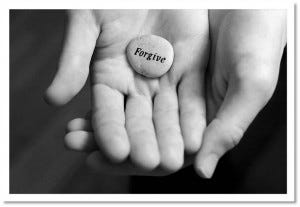Forgiveness

Have you ever prayed the Lord’s Prayer? Most people have, or at least have heard it. Jesus told the disciples in Matthew 6:9-13, “Our Father in heaven, Hallowed be Your name. 10 Your kingdom come. Your will be done On earth as it is in heaven. 11 Give us this day our daily bread. 12 And forgive us our debts, As we forgive our debtors. 13 And do not lead us into temptation, But deliver us from the evil one. For Yours is the kingdom and the power and the glory forever.”
Right in the middle of the prayer is a huge statement. In verse 12 it says, “And forgive us our debts, As we forgive our debtors.” What Jesus is saying is that the way we forgive others is the way that God forgives us. In fact, he felt it was so important that in Matthew 6:14-15, “"For if you forgive men their trespasses, your heavenly Father will also forgive you. 15 "But if you do not forgive men their trespasses, neither will your Father forgive your trespasses."
It comes down to a simple mathematical equation: My forgiveness of others + God’s forgiveness of me = Redemption. Redemption means that I am right with God, my sins are forgiven and I am right with others.
Why would Jesus tie our forgiveness by God with the way we forgive others? There are a couple of reasons.
First of all, for us to get along with the people around us, we can’t walk around with grudges and the pain of being unforgiving. When we are upset at others it affects the way we deal with everybody in our lives, not just the person we are upset at.
God also knew that unforgiveness would tear us up from the inside out. Better Health Research shows that resentment and a general lack of forgiveness raises blood pressure, depletes immune systems, and makes you more easily depressed, causing stress to the body.
So how do we do this? Let’s be honest, there are people we don’t want to forgive. We don’t like them, they are mean, and we don’t feel they deserve forgiveness. And you may be right. They may not deserve to be forgiven, but you do.
Peter came to Jesus and asked him, in essence, “Lord, how many times do I have to forgive my brother? I’ll be generous and forgive him seven times.” Jesus looked at Peter and said, “No, Peter, seven times isn’t going to work. Let’s start with seventy times seven.” The problem wasn’t that the other guy was going to need to be forgiven 490 times, Peter was going to need to be forgiven that much. Jesus was saying, “Peter, don’t limit the forgiveness you will get by limiting the forgiveness you give.”
Now you may be reading this and saying to yourself, “That’s all well and good, Jerry, but I’m not a Christian, so I’m not worried about God forgiving me.” While I wish you would accept Christ, forgiveness is still needed in your daily life.
How many marriages break up because of unforgiven slights and petty arguments that are allowed to fester? How many parent/child relationships are permanently damaged because kids won’t forgive their parents or parents won’t forgive their kids? Forgiveness is not just for Christians.
The final step of forgiveness is forgiving yourself. Peter denied Jesus then went on to become one of the most influential people in the New Testament. If he continued to wallow in his failures he could never have done that.
As we approach Easter, it is a good time to think about forgiving the way Jesus forgave us when he went to the cross.
Making sure I’m forgiving and forgiven… Jerry



